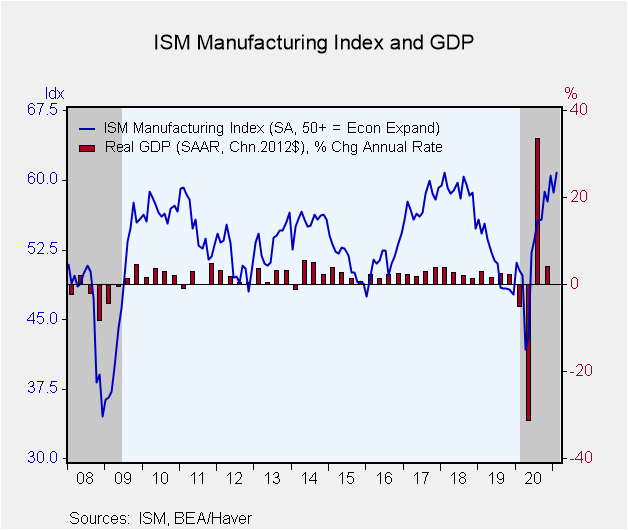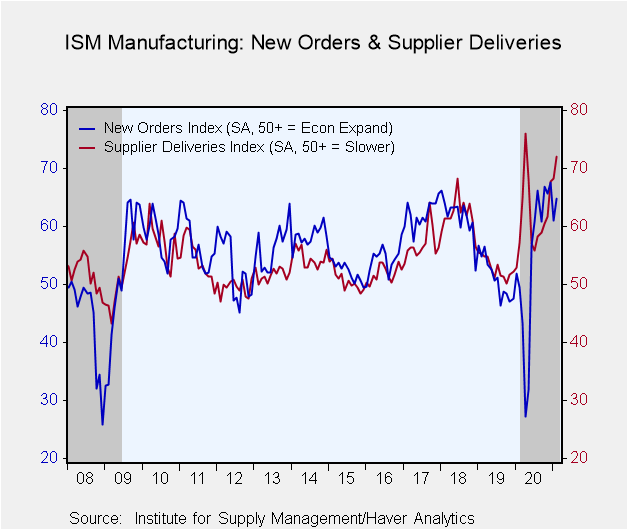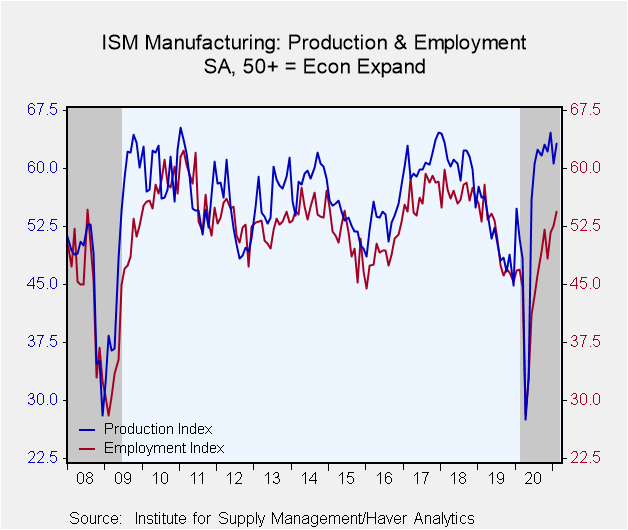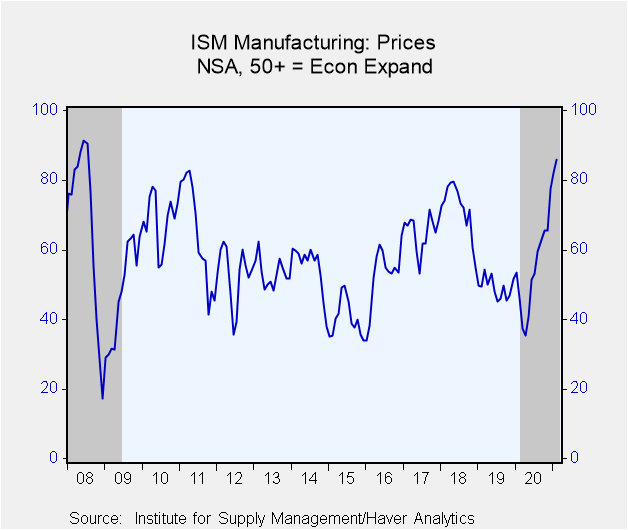 Global| Mar 01 2021
Global| Mar 01 2021ISM Manufacturing Index Improves in February as Prices Continue to Strengthen
by:Tom Moeller
|in:Economy in Brief
Summary
• Factory activity increases to three-year high. • Component gains are broad-based. • Pricing power improves further. Factory sector activity recovered last month following moderate weakening in January. The Institute for Supply [...]
• Factory activity increases to three-year high.
• Component gains are broad-based.
• Pricing power improves further.
Factory sector activity recovered last month following moderate weakening in January. The Institute for Supply Management (ISM) reported that its Composite Index of Manufacturing Sector Activity rose to 60.8 during February after falling to 58.7 in January, down from 60.5 in December. The reading exceeded expectations for 58.8 in the Action Economics Forecast Survey. It was the ninth consecutive month above the break-even level of 50 and the highest figure since February 2018. During the last 15 years, there has been a 42% correlation between the composite index and the quarterly change in real GDP. Before the recession began, there had been a 67% correlation.
The new orders index rose sharply to 64.8 but remained below its December high of 67.5. An improved 42% (NSA) of survey respondents reported stronger new orders and a reduced six percent reported a decline. The production index rose sharply to 63.2 and recovered more than half of its January decline. A higher 37% (NSA) of respondents reported higher production while a fairly steady 12% reported a decline. Supplier deliveries index rose to 72.0 indicating the slowest rate of order fulfillment since April 2020. To the downside, the inventories index eased to 49.7, indicating the first month inventory runoff following four months of accumulation.
Also rising last month was the employment measure to 54.4. It was the highest level since March 2019 and increased from April's low of 28.2. A slightly higher 19% (NSA) of respondents reported higher payrolls but a lessened 12% reported a decline, down from 47% in April.
Pricing power continued to strengthen. The prices paid index rose to 86.0 (NSA), up significantly from last April's low of 35.3. It was the highest level since July 2008. A strengthened 73% of respondents reported higher prices compared to April's low of 10%. One percent reported price declines, down from 39% in April.
Other series in the ISM report indicated improvement. The order backlog measure surged to 64.0, up from 37.8 last April and the highest level since April 2004. The new export order measure rose m/m to 57.2 and remained up from the April 2020 low of 35.3. The import series eased slightly to 56.1 and has been moving sideways for six months.
The ISM figures are based on responses from over 400 manufacturing purchasing executives from 20 industries, which correspond to their contribution to GDP in 50 states. These data are diffusion indexes where a reading above 50 indicates expansion. The figures from the Institute for Supply Management can be found in Haver's USECON database; further detail is found in the SURVEYS database. The expectations number is available in Haver's AS1REPNA database.
| ISM Mfg (SA) | Feb | Jan | Dec | Feb'20 | 2020 | 2019 | 2018 |
|---|---|---|---|---|---|---|---|
| Composite Index | 60.8 | 58.7 | 60.5 | 50.3 | 52.5 | 51.2 | 58.9 |
| New Orders | 64.8 | 61.1 | 67.5 | 49.5 | 54.0 | 51.2 | 61.6 |
| Production | 63.2 | 60.7 | 64.7 | 50.9 | 53.8 | 51.3 | 60.9 |
| Employment | 54.4 | 52.6 | 51.7 | 46.9 | 44.3 | 50.9 | 56.9 |
| Supplier Deliveries | 72.0 | 68.2 | 67.7 | 57.3 | 61.6 | 52.9 | 62.0 |
| Inventories | 49.7 | 50.8 | 51.0 | 46.7 | 48.8 | 49.9 | 52.9 |
| Prices Paid Index (NSA) | 86.0 | 82.1 | 77.6 | 45.9 | 54.0 | 49.1 | 71.7 |
Tom Moeller
AuthorMore in Author Profile »Prior to joining Haver Analytics in 2000, Mr. Moeller worked as the Economist at Chancellor Capital Management from 1985 to 1999. There, he developed comprehensive economic forecasts and interpreted economic data for equity and fixed income portfolio managers. Also at Chancellor, Mr. Moeller worked as an equity analyst and was responsible for researching and rating companies in the economically sensitive automobile and housing industries for investment in Chancellor’s equity portfolio. Prior to joining Chancellor, Mr. Moeller was an Economist at Citibank from 1979 to 1984. He also analyzed pricing behavior in the metals industry for the Council on Wage and Price Stability in Washington, D.C. In 1999, Mr. Moeller received the award for most accurate forecast from the Forecasters' Club of New York. From 1990 to 1992 he was President of the New York Association for Business Economists. Mr. Moeller earned an M.B.A. in Finance from Fordham University, where he graduated in 1987. He holds a Bachelor of Arts in Economics from George Washington University.
More Economy in Brief
 Global| Feb 05 2026
Global| Feb 05 2026Charts of the Week: Balanced Policy, Resilient Data and AI Narratives
by:Andrew Cates










